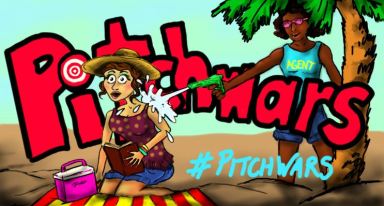Funny story. I didn't know about this contest until I was aimlessly wandering around my twitter feed and found it about a week before my query would be due. So not wanting to miss an opportunity, I worked my butt off for a week, getting everything ready, and submitted.
I didn't really know how big of a deal this was, or how I would actually be asked for more pages. But two days later, I was asked for twenty-five more pages. Then fifty. Then a full. The absolute fear of handing over your entire manuscript to a possible mentor is something I've never experienced before. I may be a published author with editing credentials and a fourth of an MFA and teaching Creative Writing under my belt, but this was a whole new ballpark that for some reason, I hadn't run into before.
So I submitted. I stayed up in a Nyquil-sick stupor in a pile of Kleenexes while Alex played "Under Pressure" by Queen over the speakers as the mentee/alternate list was thrown out into the world.
HostGator won all the prizes in its site crash.
But five minutes later, I saw my story listed as an alternate for Sarah Guillory.
It's a weird thing, getting validation as a writer. We're taught not to want it, and we sign on to not expect it. But such a small thing like being chosen for PitchWars --- a small thing like more than one mentor cheering you on in cryptic tweets --- it adds that little drop of magic into your story, doesn't it? "I can't stop reading your beautiful words," another mentor wrote on her twitter at the same moment she sent me a request for a full. And someone saying I had beautiful words made my year.
My little manuscript, which I see so brightly in my own head, was beautiful to someone else.
Sometimes we lose some, but sometimes ... sometimes we actually win some.
So what did I learn from PitchWars? What didn't I learn from PitchWars? I learned how to write a query, much to the chagrin of my writing group and the four hours I held them hostage to help me. I learned how to communicate with "agents." I learned what a partial and what a full is. And above learning, I am so grateful for the experience. Everyone was so kind, so supportive of each other. Everyone wanted the best for each other, because we all know what it's like. We're all writers, and although there are only so many slots for so many people, we all get it. We all are loners who don't want to be alone, and there's something wonderful and empathetic in that. Writers rock. That's what I'm trying to say.
Now we get onto the second part of this blog post, which is what can we do when we get sick? This is still one that I'm trying to figure out. A few years ago, I got really sick. Like really sick. A procedure didn't go as planned. In the middle of a routine checkup, they found a tumor. Not only did that tumor throw a wrench into everyone's plans, but it also gave the doctors cause to just chuck as much anesthesia they could find at my IV drip. I had to be completely out in order for them to try to remove the sucker, and that meant a split-second decision to pump me to sleep.
I'd never recovered from surgery before, and lemme tell you, it's not like how it is in the Disney movies. You don't just flutter awake and go, "Oh my, did it go well?" and then go home and everything is peachy keen. It took a good month and a half for me to feel normal again. And that's not even talking about the lifestyle changes I had to make in order to keep myself cancer-free.
Did I write during that time? No. Do I wish I had? Yes.
I always think about that lost month and a half when I get sick now. Now when I say get sick now, I mean when I get an awful cold and can't go outside for a day or so. When you feel like crud, what can you do? This morning I woke up, and my sinuses pressed up against the back of my eye, and I couldn't even see the words on my laptop screen. This is a frustrating experience. But I grabbed some gauze, taped it to my bad eye, and kept typing. Because sometimes you just have to be Patchy the Pirate to do what you need to do.
But what can you do? Anything you can do. Audiobooks. Music playlists. Mental planning. Phone calls. Notebooks. Drawing. Or hell, writing. Walt Disney plotted out a good amount of his revisions to Disney World's blueprints from his deathbed. They say he "drew it on the hospital ceiling." I don't think he literally did this, because the man was dying and did not have Stretch Armstrong arms, but you get the gist. If you are a writer, you need to write.
If you want to be a published writer, you need to submit your work.
Keep going. Keep fighting. Keep writing.
And come November, check out the #PitchWars Alternate Showcase. I'll see you there. (I Write For Apples hosts this year)

 RSS Feed
RSS Feed